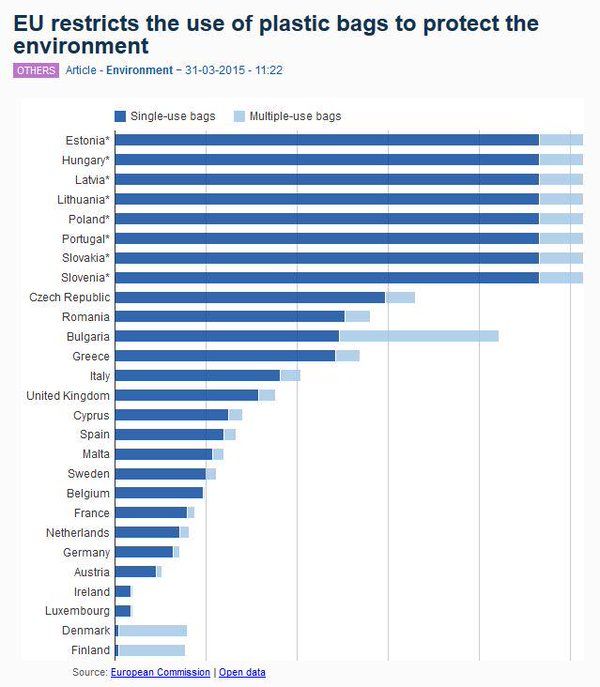Blog post -
France goes green: plastic bag days are over
France has boosted its ecological credentials with a recent ban on plastic grocery bags, which came into effect on July 1. This measure will concern supermarkets, pharmacies, bakeries, petrol stations, and both covered and open-air markets. However, shops will still be allowed to sell shopping bags that are thicker than 50 micrometers, on the basis that they are reusable.
The ban on common grocery bags will be followed by a ban on small plastic bags used for fruit and vegetables, or meat and fish, which will go into force on January 1, 2017. According to the French government, 5 billion plastic bags are given out at checkout counters in France each year, and 12 billion are used to wrap fruit and vegetables. The ban came into force just in time for International Plastic Bag Free Day on July 3.

Each of those 17 billion plastic bags takes several hundred years to biodegrade. According to a study published in the journal PLOS ONE, there is a minimum of 5.25 trillion pieces of plastic debris in the world's oceans. Because plastic takes so long to decompose, one piece can kill several living creatures. They are particularly hazardous to marine animals, which can often ingest the bags. According to the French environment ministry, 94% of birds in the North Sea have plastic in their stomachs, as do 86% of marine turtles.

The only bags permitted by the new law will be “bio-sourced” bags, which are made of a blend of plastic and cornstarch or potato starch. If composted by consumers, these bags will decompose in water and in CO2. The ban will create increased prices for the consumer. The cost of a bio-sourced bag is indeed a few cents, compared to half a cent for a plastic bag. But most French consumers have had time to get used to the change, as large retailers over the past ten years have significantly lowered the number of bags distributed free at cashiers.

The new bags could also represent an opportunity for French manufacturers, who currently produce only 2.6 billion of the 17 billion plastic bags distributed in French stores each year. 80% of them are imported, mostly from Asia.
Environment Minister Ségolène Royal said: “The development of these new bio-sourced plastics will create 3,000 jobs in France."
The government hopes that the new law will put France on a par with more environmentally friendly countries like Denmark and Finland, where inhabitants only use an average of 4 plastic bags per year. Citizens of these Nordic countries are way ahead of the average European, who uses 198 plastic bags per year.

France is a pioneer but not the first EU Country to impose the ban. Italy started to ban single-use plastic bags back in 2012, partly for environmental concerns, partly for economic reasons, in order to favor its strong “biodegradable” plastic bags industry.
In April 2015 the EU Parliament ruled that member states must reduce plastic bag use by 80% by 2025.
While some countries like France have opted for a ban, others like Ireland and the UK have introduced plastic bag charges in an effort to minimise their use.

Sources:
http://www.france24.com/en/20160701-france-bans-plastic-bags-distributed-stores
https://sputniknews.com/europe/20160704/1042417621/france-grocery-bag-ban.html
Read more Swedbrand blog posts at swedbrand-group.com/blog, or visit our website at swedbrand-group.com.
Topics
- Packaging, packing
Categories
- plastic bags
- banned
- france
- reusable bags